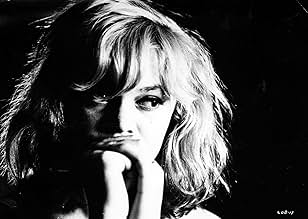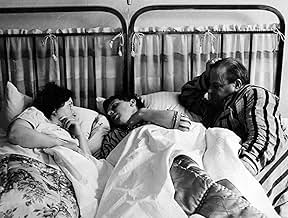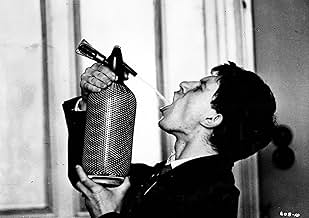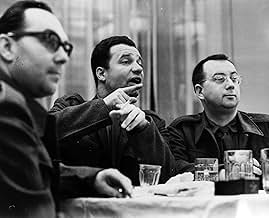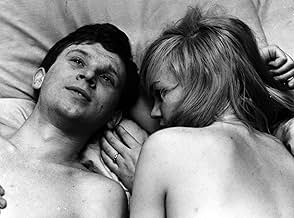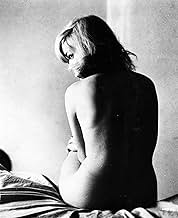AVALIAÇÃO DA IMDb
7,4/10
10 mil
SUA AVALIAÇÃO
Adicionar um enredo no seu idiomaFactory manager gets army reserves to boost female workers' morale. Local beauty spurns them for jazz pianist who seduces her. She leaves for Prague to find him but his parents are displease... Ler tudoFactory manager gets army reserves to boost female workers' morale. Local beauty spurns them for jazz pianist who seduces her. She leaves for Prague to find him but his parents are displeased when she arrives.Factory manager gets army reserves to boost female workers' morale. Local beauty spurns them for jazz pianist who seduces her. She leaves for Prague to find him but his parents are displeased when she arrives.
- Direção
- Roteiristas
- Artistas
- Indicado a 1 Oscar
- 2 vitórias e 4 indicações no total
Jana Novaková
- Jana
- (as Jana Nováková)
Jindrich Heidelberg
- Reditel
- (não creditado)
Dana Valtová
- Bohunka
- (não creditado)
Avaliações em destaque
Andula is working-class girl living in a Czech town.She sleeps with a pianist called Milda after a party.When she doesn't hear from him, she travels to his parents place, where he still lives.Lásky jedné plavovlásky (English title Loves of a Blonde) from 1965 was the first big hit of Milos Forman.This Czechoslovakian film was nominated for the Golden Globe and Academy Award for best foreign film.In my country, Finland, it won a Jussi Award.Hana Brejchová is wonderful as Andula.Vladimir Pucholt is terrific as Milda.Milada Jezkova and Josef Sebánek are great as his parents.The dialogue is marvelous.Like when Andula and Milda are lying in bed and he explains to her how she's angular.That the woman is shaped like a guitar but she's one painted by Picasso.And there are some terrific scenes.The restaurant scenes are fantastic.Those men on their table are checking on the women on their table, trying to find a way to approach.And when Andula arrives at Milda's place and the mother can't deal with it.Great work from the Czech master.
This is the second of Forman's Czech films I've watched after the other Criterion release, THE FIREMAN'S BALL (1967) - though that was via a late-night Italian TV broadcast some years ago; these two films constitute his most celebrated work from this early phase in his career.
While a pleasant and sharply-observed comedy-drama in itself, which must have seemed fresh at the time (particularly the intimate detail of its teenage romance), I feel that a lot of these unassuming but critically-acclaimed foreign films - often made under strained political conditions - tend to come off as overrated when viewed today (a similar recent example I encountered was CLOSELY WATCHED TRAINS [1966]). That said, the film benefits immensely from the wonderful cinematography by Miroslav Ondricek (Forman's longtime collaborator).
Besides, it also includes a couple of lengthy - and delightful - set-pieces: the party sequence, in which the heroine and her two best friends are picked up by a trio of geeky middle-aged soldiers; the scene at the home of the girl's 'boyfriend' (with whom she had a one-night stand), where she causes a commotion by turning up unannounced on his doorstep with a packed suitcase!
The DVD supplements comprise an amusing but irrelevant deleted scene, and an interesting 17-minute interview with Forman - in which he discusses the film's genesis and how the mix of professional and untrained actors proved providential, sealing its essential charm.
While a pleasant and sharply-observed comedy-drama in itself, which must have seemed fresh at the time (particularly the intimate detail of its teenage romance), I feel that a lot of these unassuming but critically-acclaimed foreign films - often made under strained political conditions - tend to come off as overrated when viewed today (a similar recent example I encountered was CLOSELY WATCHED TRAINS [1966]). That said, the film benefits immensely from the wonderful cinematography by Miroslav Ondricek (Forman's longtime collaborator).
Besides, it also includes a couple of lengthy - and delightful - set-pieces: the party sequence, in which the heroine and her two best friends are picked up by a trio of geeky middle-aged soldiers; the scene at the home of the girl's 'boyfriend' (with whom she had a one-night stand), where she causes a commotion by turning up unannounced on his doorstep with a packed suitcase!
The DVD supplements comprise an amusing but irrelevant deleted scene, and an interesting 17-minute interview with Forman - in which he discusses the film's genesis and how the mix of professional and untrained actors proved providential, sealing its essential charm.
10dlpullar
I hadn't seen any of Milos Forman's work before I saw this, and it really surprised me (pleasantly). It was a really funny film, with clever characters, very realistic interactions and some surprisingly cheeseless slapstick moments. Also has a movingly downbeat finale.
I doubt many people will make the effort to watch a little known black and white Czech film from the 60s, but those that do will be rewarded.
I doubt many people will make the effort to watch a little known black and white Czech film from the 60s, but those that do will be rewarded.
10jtur88
I don't think I've ever seen a movie that so faithfully captured the sense of place. I spent many months in the mid-60's in Czechoslovakia and Eastern Europe, and when I recently saw this film, it brought tears of nostalgia to my eyes. The scene in the parents' house, when the family was faced with the arrival of the unexpected stranger, is documentary in its portrayal of how a household would look in those times, complete to the smallest details of housekeeping and behavior. It is light-hearted without being slapstick, and it is poignant without being corny. Every character is right on the mark. On my very very short list of the greatest movies ever. In short, it is perfect. See this film, and take the whole family.
It is true but sad that no one in the world would have known about a small Czech town named Zruc if Czech director Milos Forman had not made this film.It is a good thing that he has made it as its fresh appeal would ensure that it is remembered as a supreme example of a famous cinema movement of the sixties called Czech new wave."Lásky jedné Plavovlásky" is a touching film about sad realities, disappointments in love faced by innocent people when they pursue an idle romantic relationship.It is based on a real event which took place in Milos Forman's life when at Prague he saw a beautiful albeit a lost girl roaming in the middle of the night.We see the lives of young people especially young girls who feel bored as there is hardly any male companionship available to them.As this film was made in socialist times we also get to see the attitude of parents belonging to a socialist system.Milos Forman makes his film memorable when he deals with risks which young people take when they fall in live.He conveys that it is not so easy to continue a relationship which has remained frivolous from its inception.Loves of a blonde maintains it serious stance as there is a talk of a serious problem of dwindling male female ratio faced by many European nations.One of the most funny moments of this film include a good social experiment when an army unit is asked to move to Zruc in order to woo its lonely girls.
Você sabia?
- CuriosidadesDirector/screenwriter Milos Forman got the idea for the movie when he met a young girl with a suitcase in the streets of Prague. Her story was very similar to the one in the film.
- ConexõesFeatured in Fejezetek a film történetéböl: A cseh új hullám (1990)
Principais escolhas
Faça login para avaliar e ver a lista de recomendações personalizadas
- How long is Loves of a Blonde?Fornecido pela Alexa
Detalhes
- Data de lançamento
- País de origem
- Idioma
- Também conhecido como
- Loves of a Blonde
- Locações de filme
- Zruc nad Sázavou, República Tcheca(formerly Czechoslovakia)
- Empresas de produção
- Consulte mais créditos da empresa na IMDbPro
- Tempo de duração
- 1 h 28 min(88 min)
- Cor
- Mixagem de som
- Proporção
- 1.37 : 1
Contribua para esta página
Sugerir uma alteração ou adicionar conteúdo ausente

